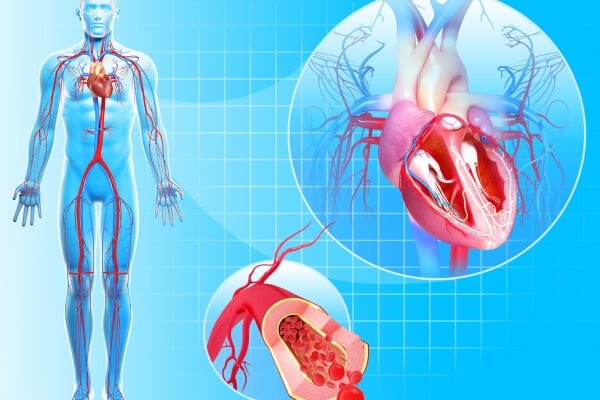Assessment of your cardiovascular risk in our practice
In our practice, we offer a comprehensive portfolio of screenings to determine your individual cardiovascular risk (CVD assessment). If this is elevated, we will advise you on how we can lower it together and maintain or optimize your health as part of an individualized, customized health consultation.
For your information, here is an excerpt of laboratory tests that we regularly perform to determine cardiovascular risk. Especially in case of a family history of heart attacks or strokes, preventive medical testing at a young age makes sense.

Standard measurements:
Here we determine your long-term blood sugar level (HbA1c), and your blood lipids (cholesterol, LDL and HDL cholesterol, triglycerides). Likewise, we perform a measurement of your blood pressure in our practice.
Lp-PLA2 measurement:
Lp-PLA2 is the abbreviation for the term: lipoprotein-associated phospholipase A2. Elevated levels lead to increased cardiovascular risk. Lp-PLA2 is a biomarker that can be used to measure the involvement of the blood vessel wall in systemic inflammatory diseases, and Lp-PLA2 itself has proatherogenic properties, promoting the development of atherosclerosis.
⇒ You can find more information here: https://www.imd-berlin.de/fachinformationen/diagnostikinformationen/lipoprotein-assoziierte-phospholipase-2-lp-pla2
Homocysteine:
Elevated homocysteine concentration is a major risk factor in the development of atherosclerosis and is considered a risk factor of symptomatic vascular diseases such as coronary heart disease, deep vein thrombosis, hypertension and stroke.
Likewise, there is an association with a number of neurological damages (such as Mb. Parkinson, multiple sclerosis, etc.), which can be causally triggered by elevated homocysteine concentrations in the blood. It is also possible that high homocysteine concentrations in pregnant women are the cause of neural tube defects in the fetus. As you can see, a determination makes sense not only with regard to cardiovascular diseases.
⇒ You can find more information here: https://www.imd-berlin.de/fachinformationen/diagnostikinformationen/homocysteinaemie
MDA-LDL:
MDA-LDL is a marker for systemic oxidative stress. MDA-LDL is a cardiovascular risk marker independent of total LDL.
⇒ You can find more information here: https://www.imd-berlin.de/fachinformationen/diagnostikinformationen/homocysteinaemie
⇒ Further information on oxidative stress
TMAO:
Trimethylamine oxide (TMAO), which is oxidatively formed in the liver from trimethylamine (TMA), is among the key bacterial metabolites that play a prominent role in the development of cardiovascular disease, independent of other risk factors.
There is also a link between the gut bacterial microbiome and cardiovascular risk. TMA is formed from choline and carnitine contained in meat and eggs by TMA-forming enzymes of intestinal gut bacteria. Dietary supplements containing L-carnitine can also lead to an increase in TMAO concentration if there is corresponding enzyme activity in the intestine. Thus, increased TMA formation in the gut is dependent on the individual gut microbiome (https://www.dr-kirkamm.de/tma-bildende-darmbakterien).
Numerous studies show that TMAO is not only a cardiovascular risk factor, but is also associated with generalized atherosclerosis, increased tendency to thrombosis, fatty liver, insulin resistance as well as visceral obesity
Source: https://www.ganzimmun.de/labor/wichtige-laborinformationen/biomarker-der-arteriosklerose
Urine examination:
Microalbumin in spontaneous urine. Elevated urinary microalbumin concentrations significantly increase cardiovascular risk.
Preventive all-round check-up
We perform preventive all-around check-ups in our practice to optimize health. In addition to the assessment of the individual cardiovascular risk, we also determine your status of the most important vitamins and trace elements, the exposure to biochemical forms of stress, the heavy metal contamination in the body, perform HRV measurements, and much more.
